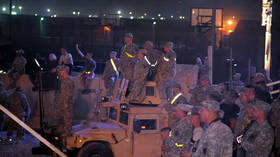Pentagon faces human trafficking accusations – WaPo

American military bases in the Persian Gulf region use the services of subcontractors whose staff could be classed as victims of human trafficking, the Washington Post reported on Thursday. US federal law bans paying taxpayer money to contractors that allow such practices.
Foreign workers in Arab nations including Qatar and Kuwait are employed under the controversial “kafala system”, which requires a citizen, usually the employer, to take legal charge of the employee. Critics say the scheme is prone to abuse, making workers unable to leave jobs when they want to, and otherwise puts them at a disadvantage.
According to the Washington Post, US military contractors hiring menial and low-skilled staff for the Pentagon’s bases in the Arab world are involved in such abuses. It cites the accounts of dozens of workers, reporting that their passports were taken away to limit their movements or that they paid a hefty entry fee to get a job at a US facility, which could take years to repay.
US federal law against human trafficking requires contractors to investigate claims of such abuses, but workers believe US military officials, defense contractors and Gulf recruiting agencies have agreed to turn a blind eye.
“One day, we shared with our project manager that we had paid this fee, but he said [the company is] helpless,” one of the interviewees, a former worker at Al Udeid Air Base in Qatar, told the newspaper.
“I think it’s a mutual understanding. The American managers know about the fee, and they say nothing. They avoid talking about it,” he added.
The entry fee can amount to thousands of dollars, and people in countries such as India, Nepal and Bangladesh often obtain high-interest loans or sell their assets to pay them. Their wages in the Gulf region may turn out to be lower by an order of magnitude than what they were promised in their home country. The report estimated that people they interviewed earned between $1.52 and $3.70 an hour.
The US Government Accountability Office (GAO) considers such fees a form of debt bondage, the Washington Post noted.
“We have very clear regulations now saying that you cannot charge recruitment fees,” Latesha Love, director of international affairs and trade at the GAO, told the newspaper. “Holding passports and things of that nature are not something that can be done on contracts with our federal dollars.”
Specific firms named by the newspaper denied condoning abuses of workers, and said they were working to eradicate such practices.
The report is part of a new series penned by the International Consortium of Investigative Journalists and its media partners throughout the world, including the Washington Post, which focuses on human trafficking.














